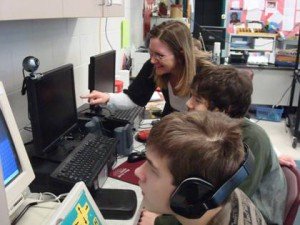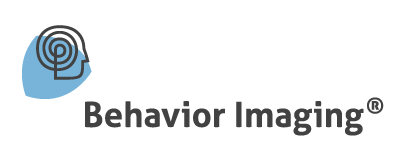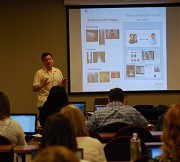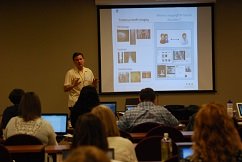Contact: Brian C. Cronin
Phone: 208.439.8493
FOR IMMEDIATE RELEASE
208.724.1959
(BOISE) – In a new study funded by the National Institutes of Health (NIH), educators overwhelmingly embraced Behavior Imaging technology as a means of more effectively treating children with autism. The study’s results are being published at a time when nearly every state in the nation is being forced to cut school budgets and is seeking innovative and cost-effective ways to deliver services to students with special needs.
Dr. Uwe Reischl, M.D., Ph.D, of Boise State University coordinated the study, which examined not only the efficacy of B.I. Capture (a Behavior Imaging tool that captures and stores behavioral events via remote control video) in treating students with autism, but also the ease with which teachers and behavior specialists were able to utilize the technology.
“We are finding that autism educators are far more receptive to using Behavior Imaging than we had originally expected,” noted Reischl. “This is especially so for participants who not only want to use it for behavior analysis but who also see it as a useful tool for assessing student skills, giving or receiving consultation, and training students and staff.”
Behavior Imaging is the video capture and secure sharing of behavior in a natural environment for treatment, training, assessment, and other clinical purposes. Initially developed by the Georgia Institute of Technology, the system captures, on video, a child’s behavioral episodes in educational, clinical, and home environments. Behavioral data that is captured is then used to characterize recognized aspects of behavior to assist in the diagnosis, treatment, and research of autism. With video that can be viewed, annotated, and stored online, behavioral experts can guide students’ progress from anywhere in the world.
Of the participating educators, 74 percent agreed that B.I. saved time and money by enabling them to easily capture on video what preceded a student’s inappropriate behavior (the antecedent, in clinical terms). This critical data can then be used to develop an appropriate behavior program. The majority of the participants reported that they will be able to serve more students than before. With respect to ease of use, 100 pecent of the participants indicated that they did not require any additional training above and beyond what was provided when the technology was first installed.
An earlier phase of the study demonstrated that the technology enabled a 43 percent reduction in errors when collecting data for a Functional Behavior Assessment (FBA) program. Now, in addition to more effective clinical diagnoses and treatment, B.I. also can be used to save qualified practitioners time and money by obviating the need to only observe autistic behavior in person.
Application of this technology to staff training, student assessment, and supervision of students by their parents was reported as providing a significant benefit. “This would be tremendously helpful to our organization because we have 16 locations around the world, and training and mentorship from central locations to the remote sites would be greatly enhanced with these capabilities”, according to one participant. Other participants commented that Behavior Imaging would address a critical need in rural schools, which often lack resident specialists.
Dr. Matthew Goodwin, Director of Clinical Research at the MIT Media Lab and Associate Director of Research at The Groden Center in Providence, RI noted, “Easily gathering, sharing, and reviewing a child’s clinically meaningful behavior with B.I. Capture could revolutionize how parents, educators, and behavior analysts collectively understand and support children with autism and related developmental disabilities.”
Who is Dr. Uwe Reischl?
Dr. Reischl, M.D., Ph.D., has more than 25 years of experience in applied research and program management. He has served as a science advisor to the World Health Organization in Geneva, Director of the Center for Health Policy at Boise State University, and as a Clinical Advisor to the AutismCares Coalition for the evaluation of emergency relief efforts for Katrina-affected autism families. He is the former CEO of UTEK Corp., a publicly-traded innovation, technology transfer, and IP firm, and is a professor at the College of Health Sciences at Boise State University.
How was the study conducted?
The National Institutes of Health funded TalkAutism LLC of Boise, Idaho to assess how B.I. Capture, a Behavior Imaging tool, can help educators and caregivers record relevant behaviors on video for subsequent retrieval, review, and annotation. The study involved 29 people from 11 clinical sites with a beta version of B.I. Capture. The participants were given access to the technology for one month and were given eight structured exercises to complete involving B.I. Capture usage. Each exercise was followed up with a questionnaire. After completion, each participant was given an exit questionnaire to determine overall satisfaction and perceptions of the B.I. Capture technology.
What is B.I. Capture?
B.I. Capture™ is a special Behavior Imaging™ tool capable of capturing and storing behavioral health events on video via remote control. Software allows users to document relevant events before, during, and after a behavior and share the behavior images with professionals remotely. The technology was developed at the Georgia Institute of Technology and is being developed and marketed by Caring Technologies/TalkAutism (Boise, ID). More information is available at www.behaviorimaging.com.

In this photo: Special Education teacher with students in classroom. Behavior Imaging camera sits on top of computer monitor and can be activated at any time by the teacher to record problematic behaviors.



